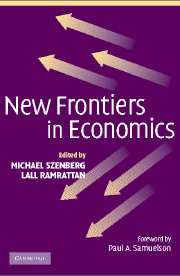Book contents
- Frontmatter
- Contents
- List of Contributors
- Foreword by Paul A. Samuelson
- Preface
- Acknowledgments
- Introduction
- PART I INFORMATIONAL BEHAVIORAL ECONOMICS AND FINANCE
- PART II MACROECONOMICS AND PUBLIC POLICIES
- PART III INTERNATIONAL TRADE AND DEVELOPMENT
- PART IV CONTRACTS, LAW, AND GAMING
- 9 Contract or War? On the Consequences of a Broader View of Self-Interest in Economics
- 10 New Directions in Law and Economics
- Author Index
- Subject Index
- References
10 - New Directions in Law and Economics
Published online by Cambridge University Press: 06 July 2010
- Frontmatter
- Contents
- List of Contributors
- Foreword by Paul A. Samuelson
- Preface
- Acknowledgments
- Introduction
- PART I INFORMATIONAL BEHAVIORAL ECONOMICS AND FINANCE
- PART II MACROECONOMICS AND PUBLIC POLICIES
- PART III INTERNATIONAL TRADE AND DEVELOPMENT
- PART IV CONTRACTS, LAW, AND GAMING
- 9 Contract or War? On the Consequences of a Broader View of Self-Interest in Economics
- 10 New Directions in Law and Economics
- Author Index
- Subject Index
- References
Summary
Law and economics began at the University of Chicago with the pioneering work of Henry Simons in the tax area and Aaron Director on antitrust. Ronald Coase contributed “The Problem of Social Cost,” sometimes said to be the most cited article in the history of economics, and launched the serious study of tort and property law from the economic perspective. The antitrust mantle was carried forward by such Chicago-connected scholars as Robert Bork, Frank Easterbrook, William Landes, and Richard Posner. Their critique of antitrust doctrine as it had emerged in the 1960s and 1970s revolutionized the field, so much so that Robert Bork claims substantial victory for Chicago school ideas in the afterword to the most recent edition of The Antitrust Paradox. Guido Calabresi at Yale introduced basic ideas of economics to the field of accident law, as Landes, Posner, and Steven Shavell at Harvard also labored to understand the economic implications of negligence, strict liability, joint and several liability, and other central features of tort doctrine. Serious work on contract law soon followed, such as Shavell's seminal work on contract remedies. The corporate area was also a natural target for economically oriented research. Chicago scholars Easterbrook and Daniel Fischel focused on the law governing changes in corporate control, for example, while Ralph Winter at Yale thoughtfully rebutted the suggestion that the state of Delaware had led corporate law racing toward the bottom, and Henry Manne wondered about the logic of insider trading rules.
- Type
- Chapter
- Information
- New Frontiers in Economics , pp. 281 - 302Publisher: Cambridge University PressPrint publication year: 2004



